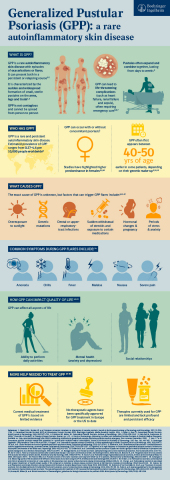Newly published trial results showed spesolimab significantly improved signs and symptoms of flare in rare, life-threatening skin disease, generalized pustular psoriasis
- New clinical trial data published today in the New England Journal of Medicine, showed that spesolimab, a novel IL-36R antibody treatment, was effective in rapidly treating adult patients with generalized pustular psoriasis (GPP) experiencing a flare.1
- The study met the primary endpoint, where 54% of patients had no visible pustules after a single dose of spesolimab, compared to 6% receiving placebo at week one. 1
- Spesolimab has been granted Breakthrough Therapy Designation in China and USA.
Boehringer Ingelheim announced today the publication in the New England Journal of Medicine of new data from the pivotal Phase II EffisayilTM 1 trial, which showed spesolimab, a first-in-class investigational treatment, significantly improved signs and symptoms of generalized pustular psoriasis (GPP) in patients experiencing a flare.1
This press release features multimedia. View the full release here: https://www.businesswire.com/news/home/20211222005031/en/

GPP is a rare, life-threatening neutrophilic skin disease, which is distinct from plaque psoriasis. It is characterized by episodes of widespread eruptions of painful, sterile pustules (blisters of non-infectious pus).2,3,4 There is a high unmet need for treatments that can rapidly and completely resolve the symptoms of GPP flares. Flares greatly affect a person’s quality of life5 and can lead to hospitalization with life-threatening complications, such as heart failure, renal failure and sepsis and even death.6
In the 12-week trial, 53 patients experiencing a GPP flare were treated with a single intravenous dose of spesolimab or placebo. Most patients at the outset of the trial had a high or very high density of pustules and impaired quality of life. Results after one week demonstrated that:
- 54% of patients treated with spesolimab showed no visible pustules compared to 6% of those treated with placebo;
- 43% of patients treated with spesolimab showed clear/almost clear skin compared to 11% of those in the placebo group.1
Pustular and skin clearance continued for the duration of the study. This clearance was accompanied by clinically significant improvements in quality of life and symptoms such as pain and fatigue, compared to placebo.1
Over the 12-week duration of the study, non-serious infections rates were higher in the spesolimab group compared with placebo, with no pattern regarding pathogen and affected organs. Two patients reported to have drug reactions with eosinophilia and systemic symptoms.
“With no approved treatments in the U.S. or E.U. for GPP flares, there is a significant unmet need for people with this distressing and painful skin condition, that often requires emergency care,” said Mark Lebwohl, MD, lead investigator and publication author, and Dean for Clinical Therapeutics, Icahn School of Medicine at Mount Sinai, Kimberly and Eric J. Waldman Department of Dermatology, New York. “These clinical trial results show that spesolimab has the potential to completely clear the skin of the signs and symptoms of a GPP flare after only one week, with sustained effect observed for up to 12 weeks.”
The U.S. Food and Drug Administration (FDA) granted Orphan Drug Designation for the treatment of GPP, and Breakthrough Therapy Designation for spesolimab for the treatment of GPP flares. This designation is for therapies treating serious or life-threatening conditions where early clinical evidence suggests a substantial improvement compared to existing treatments. The Chinese Regulatory Authority Centre for Drug Evaluation (CDE) also recently granted Breakthrough Therapy Designation for spesolimab for the treatment of GPP flares.
“At Boehringer Ingelheim, we are committed to finding transformative therapies to help advance treatment for people who urgently need them,” said Dr Emmanuelle Clerisme-Beaty, Head of Clinical Development and Medical Affairs, Dermatology, Boehringer Ingelheim. “The findings indicate that spesolimab may have a significant and positive impact on patients experiencing a GPP flare.”
The clinical program for spesolimab includes two other trials that are currently underway. First, the Effisayil-2 trial is designed to investigate spesolimab as a maintenance treatment to prevent the occurrence of GPP flares. The Effisayil-ON trial is an open label five-year extension study to investigate the longer term efficacy and safety of spesolimab in patents with GPP.7,8
Please click on the following link for ‘Notes to Editors’: https://www.boehringer-ingelheim.com/human-health/skin-diseases/gpp/spesolimab-phase-ii-data
View source version on businesswire.com: https://www.businesswire.com/news/home/20211222005031/en/
